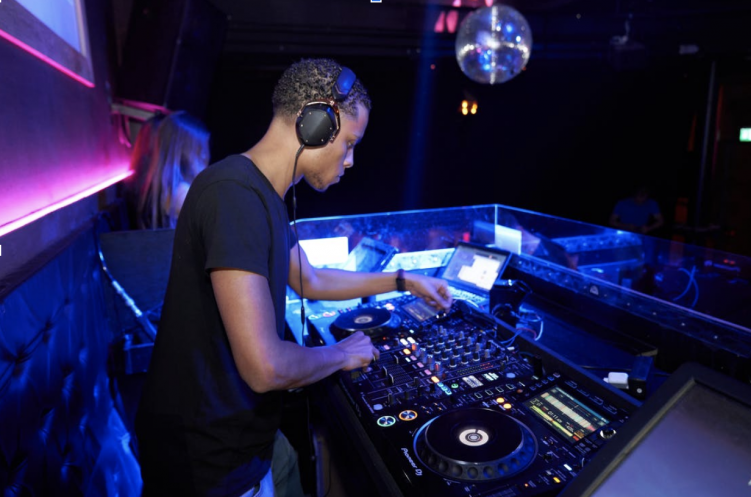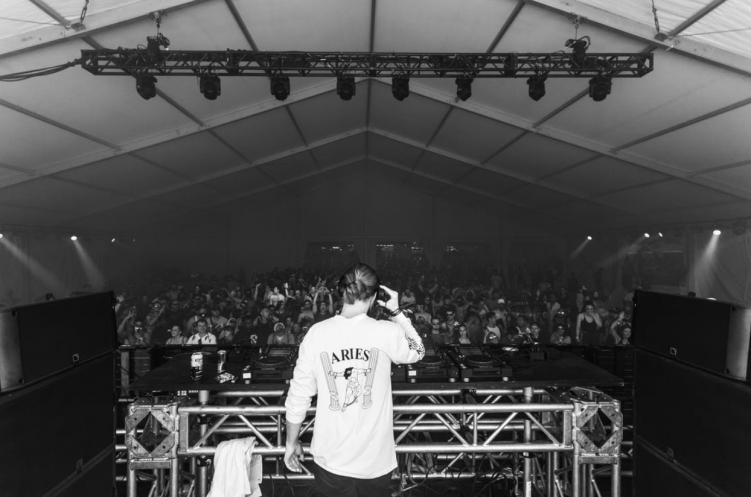So you want to be a DJ, huh? Congratulations, because you’ve selected one of the most interesting professions on the planet. That being said, there’s a lot to being a DJ — a lot more than most people think. Join us as we explore the intricacies of the DJ world and what it actually means to be one. Let’s dig right in! 
It’s a Rough Start
When people see a successful DJ, they see a person playing on a stage in front of thousands of people. The atmosphere is explosive as the audience dances to the beat. However, what people don’t see at that moment is the beginning of that DJ’s road. How did they get started, what kind of sacrifices it took, and how much it all cost?
To become a DJ, you’ll need to volunteer your time — a lot. In fact, you’ll have to call any club you can think of and pitch yourself as a performer. Then, you’ll need to take any gig that comes your way. You won’t be paid a lot, you won’t be recognized, your music may not vibe with the audiences, but you need to put yourself out there.
You’ll also have to find another job to sustain yourself during this time because chances are your DJing career won’t cover your basic needs at this point.
There are Different Ways to DJ
Playing in a club, in front of hundreds of people, is an awesome experience. However, that’s not the only way to make a bank as a DJ. Veterans of the industry from Mobile DJ Basics note that many DJs make a good living playing private events. We’re talking weddings, birthdays, and any other type of celebration.
Of course, this type of work brings a set of challenges of its own. For one, you’ll need to embrace a variety of music genres until you make a name for yourself. Mobile DJs rarely pick and choose the events they work for based on the music tastes of the audience. In most cases, you discuss the music preferences with the client, and then create a set that matches their needs.
That being said, there are instances of Mobile DJs becoming so popular in a very niche genre of music that they are only contracted for events that fit that niche. However, it’s a long road to that level of professional reputation.
You’ll Spend a Lot on Equipment
Being a DJ is a job, and just like any other job, there are tools involved. DJing tools are the equipment used to play, sample, and mix music. Different tools are designed to meet different demands. As a DJ, you’ll start out using a basic turntable, a controller, and a laptop. As you develop your skills, you’ll start outgrowing your current rig and looking to expand your horizons with a setup that is more flexible.
You’ll find that you want to do things that only a professional deck can facilitate, which means that you’ll constantly chase the next best thing in terms of gear. And that is perfectly fine, as long as you accept the fact that being a DJ means investing in your equipment. Sometimes those investments are substantial, as none of this is cheap.
Learning is Everything
The moment you stop learning is the moment you begin to go backward as a DJ. The only way to truly advance in this career is to constantly be on the lookout for knowledge. As you move around and work different gigs, you’ll meet other, often more experienced DJs. Make sure to learn from them. If they have more experience than you, chances are that they have valuable knowledge to offer. Never let your ego get in the way of your own prosperity.
Then there’s the music theory. Learning how to play an instrument can be essential for your growth. Not only will doing so force you to immerse yourself into music theory, but you’ll also gain a more profound understanding of why different things go together when you’re producing your own songs.
Any instrument will do. Granted, the knowledge of piano translates the best as you’re most likely used to using keys at this stage, but a guitar will do as well. The notes are the same, the theory is mostly the same, so pick whatever feels the most attractive to you.
You’ll Need a Manager at Some Point
Being a DJ is often perceived as being a lone wolf. There’s no band, no singers, guitar players, or drummers. It’s just you and your rig. Because of that, many up-and-coming DJs think that they can handle all aspects of their newly established business. Needless to say, that’s not always the case. In fact, that’s rarely the case with successful DJs.
More often than not, you’ll find that dealing with clubs, setting schedules, organizing tours, and stuff like that takes way too much of your time. So much so that DJs who insist on doing this part of the work often feel overwhelmed. A manager or an agent is the only viable solution when the going gets tough.
Not only are they experienced in dealing with this type of stuff, but they can dedicate their entire day to sorting out scheduling conflicts. That way you can focus on working on your music, learning, or anything else that will impact your career for the better.
It’s Not Easy
The glamour shot of a DJ dropping a beat in front of a massive group of fans shows only a small part of what it takes to be in this industry. DJing isn’t easy and often requires many sacrifices on your part. There will be awesome times, but there will also be days when you’ll question your life decisions.
Because of that, it’s essential that you get the entire picture before you take the plunge. DJing can be extremely rewarding but count on having to work hard and sometimes even waiting to see the fruits of your labor. That’s just the way it is.


So you want to be a DJ, huh? Congratulations, because you’ve selected one of the most interesting professions on the planet. That being said, there’s a lot to being a DJ — a lot more than most people think. Join us as we explore the intricacies of the DJ world and what it actually means to be one. Let’s dig right in!
It’s a Rough Start
When people see a successful DJ, they see a person playing on a stage in front of thousands of people. The atmosphere is explosive as the audience dances to the beat. However, what people don’t see at that moment is the beginning of that DJ’s road. How did they get started, what kind of sacrifices it took, and how much it all cost?
To become a DJ, you’ll need to volunteer your time — a lot. In fact, you’ll have to call any club you can think of and pitch yourself as a performer. Then, you’ll need to take any gig that comes your way. You won’t be paid a lot, you won’t be recognized, your music may not vibe with the audiences, but you need to put yourself out there.
You’ll also have to find another job to sustain yourself during this time because chances are your DJing career won’t cover your basic needs at this point.
There are Different Ways to DJ
Playing in a club, in front of hundreds of people, is an awesome experience. However, that’s not the only way to make a bank as a DJ. Veterans of the industry from Mobile DJ Basics note that many DJs make a good living playing private events. We’re talking weddings, birthdays, and any other type of celebration.
Of course, this type of work brings a set of challenges of its own. For one, you’ll need to embrace a variety of music genres until you make a name for yourself. Mobile DJs rarely pick and choose the events they work for based on the music tastes of the audience. In most cases, you discuss the music preferences with the client, and then create a set that matches their needs.
That being said, there are instances of Mobile DJs becoming so popular in a very niche genre of music that they are only contracted for events that fit that niche. However, it’s a long road to that level of professional reputation.
You’ll Spend a Lot on Equipment
Being a DJ is a job, and just like any other job, there are tools involved. DJing tools are the equipment used to play, sample, and mix music. Different tools are designed to meet different demands. As a DJ, you’ll start out using a basic turntable, a controller, and a laptop. As you develop your skills, you’ll start outgrowing your current rig and looking to expand your horizons with a setup that is more flexible.
You’ll find that you want to do things that only a professional deck can facilitate, which means that you’ll constantly chase the next best thing in terms of gear. And that is perfectly fine, as long as you accept the fact that being a DJ means investing in your equipment. Sometimes those investments are substantial, as none of this is cheap.
Learning is Everything
The moment you stop learning is the moment you begin to go backward as a DJ. The only way to truly advance in this career is to constantly be on the lookout for knowledge. As you move around and work different gigs, you’ll meet other, often more experienced DJs. Make sure to learn from them. If they have more experience than you, chances are that they have valuable knowledge to offer. Never let your ego get in the way of your own prosperity.
Then there’s the music theory. Learning how to play an instrument can be essential for your growth. Not only will doing so force you to immerse yourself into music theory, but you’ll also gain a more profound understanding of why different things go together when you’re producing your own songs.
Any instrument will do. Granted, the knowledge of piano translates the best as you’re most likely used to using keys at this stage, but a guitar will do as well. The notes are the same, the theory is mostly the same, so pick whatever feels the most attractive to you.
You’ll Need a Manager at Some Point
Being a DJ is often perceived as being a lone wolf. There’s no band, no singers, guitar players, or drummers. It’s just you and your rig. Because of that, many up-and-coming DJs think that they can handle all aspects of their newly established business. Needless to say, that’s not always the case. In fact, that’s rarely the case with successful DJs.
More often than not, you’ll find that dealing with clubs, setting schedules, organizing tours, and stuff like that takes way too much of your time. So much so that DJs who insist on doing this part of the work often feel overwhelmed. A manager or an agent is the only viable solution when the going gets tough.
Not only are they experienced in dealing with this type of stuff, but they can dedicate their entire day to sorting out scheduling conflicts. That way you can focus on working on your music, learning, or anything else that will impact your career for the better.
It’s Not Easy
The glamour shot of a DJ dropping a beat in front of a massive group of fans shows only a small part of what it takes to be in this industry. DJing isn’t easy and often requires many sacrifices on your part. There will be awesome times, but there will also be days when you’ll question your life decisions.
Because of that, it’s essential that you get the entire picture before you take the plunge. DJing can be extremely rewarding but count on having to work hard and sometimes even waiting to see the fruits of your labor. That’s just the way it is.
Related Content: